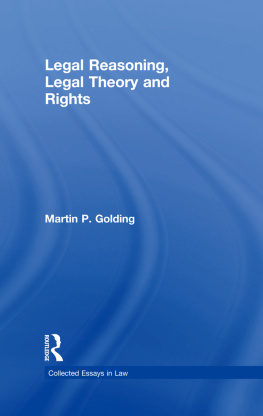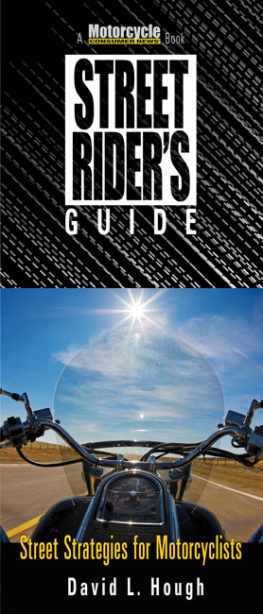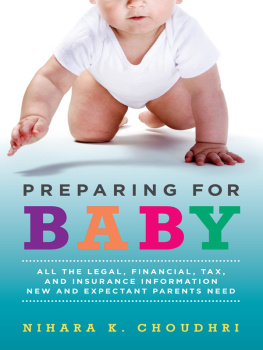MOTORCYCLISTS
LEGAL HANDBOOK
How to handle legal situations from
the mundane to the insane
PAT HAHN

First published in 2011 by Motorbooks, an imprint of MBI Publishing Company, 400 First Avenue North, Suite 300, Minneapolis, MN 55401 USA
2011, 2012 Motorbooks
Text 2011, 2012 Pat Hahn
All photographs are from the authors collection unless noted otherwise.
All rights reserved. With the exception of quoting brief passages for the purposes of review, no part of this publication may be reproduced without prior written permission from the Publisher.
The information in this book is true and complete to the best of our knowledge.
All recommendations are made without any guarantee on the part of the author or Publisher, who also disclaims any liability incurred in connection with the use of this data or specific details.
We recognize, further, that some words, model names, and designations mentioned herein are the property of the trademark holder. We use them for identification purposes only. This is not an official publication.
Motorbooks titles are also available at discounts in bulk quantity for industrial or sales-promotional use. For details write to Special Sales Manager at MBI Publishing Company, 400 First Avenue North, Suite 300, Minneapolis, MN 55401 USA.
To find out more about our books, visit us online at www.motorbooks.com.
Digital edition: 978-1-61059-800-2
Softcover edition: 978-0-76034-023-3
Library of Congress Cataloging-in-Publication Data
Hahn, Pat, 1969
Motorcyclists legal handbook : how to handle legal situations from the mundane to the insane / Pat Hahn.
p. cm.
ISBN 978-0-7603-4023-3 (softbound)
1. MotorcyclesLaw and
legislation--United States. 2. MotorcyclesLaw and legislationUnited StatesStates. 3. MotorcyclistsUnited StatesHandbooks, manuals,
etc. I. Title.
KF2220.M6H34 2011
343.730944dc23
2011032810
Editor: Steve Casper
Design Manager: Kou Lor
Designer: Simon Larkin
Layout: Chris Fayers
Cover designer: Rob Johnson, Toprotype, Inc.
Photo Credits:
All images provided by the author, with the exception of:
American Suzuki: pages
Darryl and Lori Cannon, Killboy.com: pages
iStock.com: front cover
Kawasaki Motors Corporation: pages frontis,
Polaris Industries, Inc.: pages
Shutterstock: pages
Yamaha Motor Corporation: pages , back cover
10 9 8 7 6 5 4 3 2 1
CONTENTS
PART I
The Basics
PART II
State-by-State Guide to Motorcycle Laws
The chief goal of this book is to help motorcycle enthusiasts understand how to keep their driving records clean.
A clean driving record is a key element to enjoyable motorcycling that many riders overlook. Understandably, avoiding administrative hassles isnt on anyones priority list, but when dings on your record pile up, they have a way of separating motorcyclists from the activity they love. A traffic stop is embarrassing and time consuming, and it takes the fun out of an otherwise great day of riding. Paying for something like a speeding ticket (known as entertainment tax in some circles) cuts into the fun of spending money on tires, gas, food, and those cool little hotels in the mountains.
Allowing too many traffic convictions to pile up on your record has a way of taking all the fun out of riding. You may end up being forced to park your bike for weeks or months because youre no longer legal in the eyes of the law. It doesnt have to be that way.
An added bonus for riders who steer clear of troubles with the law is that theyll be much more likely to come home in one piece. No matter what we may think about any particular motorcycle regulation, most of the laws on the books are designed primarily for the safety of the riders themselves, and following them might mean they get to enjoy many more decades in the saddle.
This book aims to turn your driving record into the least of your worrieswhich it should be.
First, you should learn how to stay unnoticed. This is most important. In Jurassic Park, the way to escape the jaws of T. rex was simply to stay put. The big monsters eyes werent good enough to distinguish an object from the background unless it was moving. Getting spotted by law enforcement (or not) works the same way. If you can become indistinguishable from the background noise of other traffic, the predator will find more obvious and satisfying prey.
Next, you have to know the laws. The oldest saying in the municipal codebook is ignorance is no excuse. And of course that is still true today. But it can get really tricky because laws pertaining to motorcyclists vary from state to state. However, there is a set of general regulations that is in fact virtually identical in every state. Some of these universal laws were adopted way back when and never changed, and there are some standard laws that states enacted to solve bigger problems; then there are some idiosyncratic laws that stand out from the rest.
Certain things are not tolerated anywhere (such as passing a school bus while its dropping off children). Other things are pretty much tolerated everywhere (such as roaring around with loud pipes) even though the laws are pretty clear that youre not supposed to be doing that.
Sooner or later it seems that everyone gets stopped. If you want to keep your record clean, its very important that you know what to do (and what not to do) when youre on the side of the road chatting with a man with a gun.
Only one in 10 Americans is a motorcycle rider; to the other nine, were a mystery. Id estimate that two or three in 10 cops are motorcycle riders, but to the rest of them were a mystery as welland our vehicles of choice can go really, really fast, and they look really, really dangerous to nonriders. A smart rider looking to preserve his or her privilege to drive is wise to understand this dilemma and take responsibility for defusing the tension of a roadside stop.
No matter how well you stay below the radar, how well you know the laws, and how well behaved you are when you are stopped, chances are youre someday going to end up with a traffic ticket in your hand. But just because the cop hands it to you (and you take it) doesnt mean you have to simply roll over and pay it. Riders interested in keeping their records clean consider a ticket only a written notice that someone, somewhere, is accusing them of doing something unsafe or illegal. It doesnt mean they actually did something unsafe or illegal. Its up to the accuser to prove a rider did something unsafe or illegal. Were innocent until proven guilty, and the onus of proof is on the accuser. Nine out of 10 or more drivers in this country just knuckle down and pay their tickets, which makes it really easy for law enforcement to justify writing them. But if youre motivated to keep your driving privileges intact, youll learn how to stand up for yourself, appear in court, and fight your traffic ticket to keep your record clean.


















